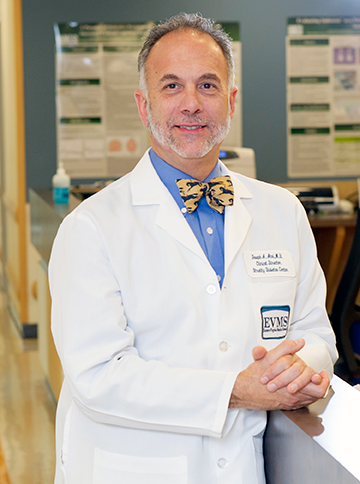Eastern Virginia Medical School
Associate Professor and Director, Strelitz Diabetes Center
 “I didn’t grow up thinking I’d be a physician. It was the furthest thing from my mind,” Dr. Joseph Aloi says, explaining, “I hated doctors when I was growing up.” He had good reason: as a dutiful grandson and nephew, he routinely drove his grandmother and aunt to various medical appointments as they each dealt with debilitating diseases. “I saw the way they were treated by their physicians,” he remembers, “and it gave me a real dislike for the profession.”
“I didn’t grow up thinking I’d be a physician. It was the furthest thing from my mind,” Dr. Joseph Aloi says, explaining, “I hated doctors when I was growing up.” He had good reason: as a dutiful grandson and nephew, he routinely drove his grandmother and aunt to various medical appointments as they each dealt with debilitating diseases. “I saw the way they were treated by their physicians,” he remembers, “and it gave me a real dislike for the profession.”
A self-described ‘nerdy science guy’, he was the first member of his family to go to college. During his freshman year at the University of Maryland at College Park, he got a job working in a lab at the National Institutes of Health, which piqued his interest and convinced him to pursue a PhD in pharmacology. At one point, he was running the chemistry lab, and loving the work, when one of his mentors, Dr. Thomas Insel, suggested he apply to medical school. “He knew I wanted to do clinical research,” Dr. Aloi says. “His reasoning was that as a PhD, I’d always need to partner with an MD, but if I became an MD, I could lead the research myself.” That might have been the end of it had Dr. Insel not cornered Dr. Aloi’s mother at a Christmas party and told her she needed to ‘make him go to medical school.”
He took the MCATs, and was invited to interview at George Washington University. “I was a full-time chemist with NIH at the time, and they offered to help me with loan applications,” he says, “and my family was extremely supportive.”
At George Washington, he continued to work at NIH, and ultimately found his niche in endocrine and diabetes. “There’s the challenging scientific part, learning how insulin functions in people and how to manage it,” he says, “but because it’s a chronic medical problem, I get to see patients regularly throughout their lives. I become a member of their family.”
Because he treats these patients in all stages of their disease, he says he’s not above using those personal relationships to blackmail them into doing the right things. He recently did a seminar at a diabetes conference on motivation. “My piece was obesity management,” he notes. “I reminded the students, ‘you have to know that what’s right for one patient isn’t right for another. You have to know how to interact with patients.’”
He’s had ample opportunities to interact with patients from all across the Commonwealth during the screenings the Strelitz Center regularly conducts, particularly for those in under- or unserved communities. For many years, Dr. Aloi and his colleagues have worked in the Western Tidewater Health District, dealing with people in every stage of diabetes. They’ve conducted community-based screenings, funded by the Obici Healthcare Foundation, where they’ve found 20 to 50 percent of the people are either diabetic or pre-diabetic.
The reception has been surprisingly good, especially in Suffolk, where more and more people are coming to understand the dangers of diabetes. “They have people in their families on dialysis at age 40 and 50, and they don’t want that for themselves,” Dr. Aloi says. “When we tell people how they’re at risk, they’re motivated to make some of these small changes, even if it’s just reducing the amount of sugary drinks they have each day. And we’re having extraordinary results with a telephone intervention tool that Phyllis Woodson, our Certified Diabetes Educator, developed. Knowing someone’s going to hold them accountable works – and we’re able to collect information that aids research.”
All tolled, he estimates, as many as 3,500 people in Virginia have been screened thus far. Often, they’re surprised to learn that they’ve been diabetic for many years. That might change if the hemoglobin A1c test were a standard part of a general physical exam, Dr. Aloi believes. “I’d fashion something similar to the cholesterol test,” he says. “Everyone knows their HDL and LDL numbers today. If we routinely gave them their A1c numbers too, they’d know what they needed to act on.” Dr. Aloi currently serves on committees of several national organizations that favor including the A1c in a general exam. “I think the time is right,” he emphasizes. “The cost is only a few dollars. We now have point-of-care testing, which gives a result in 90 seconds. Family or personal history also predict risk: someone who is African American, overweight and has a family member with diabetes is at very high risk for pre-diabetes or diabetes.”
To update physicians and medical students on the work being done in diabetes, Dr. Aloi and his team at Strelitz have developed a web-based Continuing Medical Education learning tool for EVMS, entitled Practical Management of Diabetes: A four part module. The series of four CDs offers modules on the evolution of diabetes (two sections), treatment of diabetes with oral agents and treatment with injectables. “It’s free online content at the EVMS website,” Dr. Aloi says, “and it’s good for two more years.”
When he isn’t waging a hands-on, research-based war against diabetes, Dr. Aloi faces another uphill climb – literally. A couple of times a year, he grabs his ice axe and crampons and approaches the world’s highest mountains. Lobuche, Kilimanjaro, Rainier, Machu Pichu – he accepts their challenge with equal fervor.

